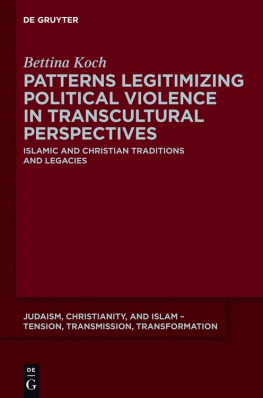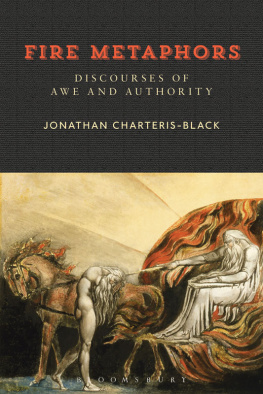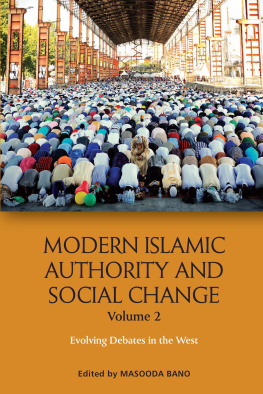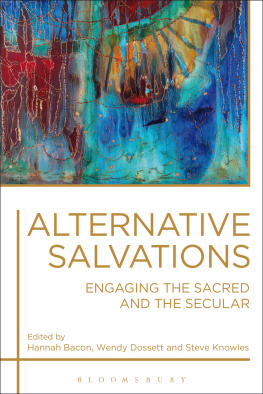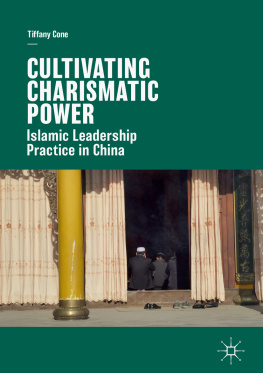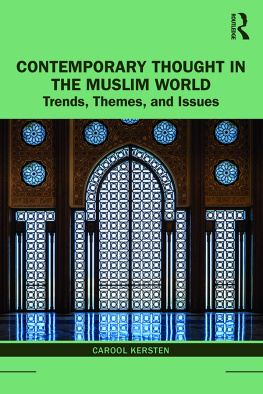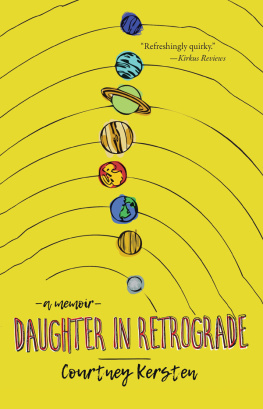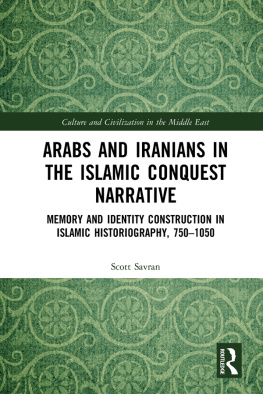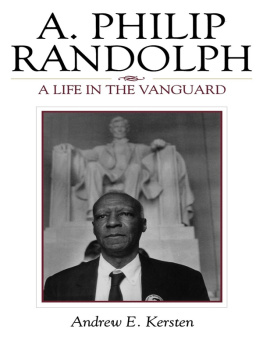ALTERNATIVE ISLAMIC DISCOURSES AND RELIGIOUS AUTHORITY
Like anywhere else, the present-day Islamic world too is grappling with modernity and postmodernity, secularisation and globalisation. Muslims are raising questions about religious representations and authority. This has given rise to the emergence of alternative Islamic discourses which challenge binary oppositions and dichotomies of orthodoxy and heterodoxy, continuity and change, state and civil society. It also leads to a dispersal of authority, a collapse of existing hierarchical structures and gender roles. This book further argues that the centre of gravity of many of these alternative Islamic discourses is shifting from the Arabic speaking heartland towards the geographical peripheries of the Muslim world and expatriate Muslims in North America and Europe. At the same time, in view of recent seismic shifts in the political constellation of the Middle East, the trends discussed in this book hold important clues for the possible direction of future developments in that volatile part of the Muslim world.
Contemporary Thought in the Islamic World
Series Editor: Carool Kersten, Kings College London, UK
Contemporary Thought in the Islamic World promotes new directions in scholarship in the study of Islamic thinking. Muslim scholars of today challenge deeply ingrained dichotomies and binaries. New ideas have stimulated an upcoming generation of progressive Muslim thinkers and scholars of Islam to radically rethink the ways in which immediate and emergent issues affecting the contemporary Islamic world are to be assessed. Central in these new discourses are notions such as cosmopolitanism, exile, authority and resistance. This series aims to take the field beyond the usual historical-philological and social science driven approaches, and to insert the study of Islam and the Muslim world into far wider multi-disciplinary inquiries on religion and religiosity in an increasingly interconnected world.
Also published in this series
The Sociology of Islam
Collected Essays of Bryan S. Turner
Edited by Bryan S. Turner and Kamaludeen Mohamed Nasir
Alternative Islamic Discourses and Religious Authority
Edited by
CAROOL KERSTEN
Kings College London, UK
SUSANNE OLSSON
Sdertrn University, Sweden
First published 2013 by Ashgate Publishing
Published 2016 by Routledge
2 Park Square, Milton Park, Abingdon, Oxon OX14 4RN
711 Third Avenue, New York, NY 10017, USA
Routledge is an imprint of the Taylor & Francis Group, an informa business
Copyright Carool Kersten and Susanne Olsson 2013
Carool Kersten and Susanne Olsson have asserted their right under the Copyright, Designs and Patents Act, 1988, to be identified as the editors of this work.
All rights reserved . No part of this book may be reprinted or reproduced or utilised in any form or by any electronic, mechanical, or other means, now known or hereafter invented, including photocopying and recording, or in any information storage or retrieval system, without permission in writing from the publishers.
Notices:
Product or corporate names may be trademarks or registered trademarks, and are used only for identification and explanation without intent to infringe.
British Library Cataloguing in Publication Data
A catalogue record for this book is available from the British Library
The Library of Congress has cataloged the printed edition as follows:
Alternative Islamic discourses and religious authority / edited by Carool Kersten and
Susanne Olsson.
pages cm. (Contemporary thought in the Islamic world)
Includes index.
ISBN 978-1-4094-4130-4 (hardcover)
1. Islam 21st century. 2. Authority Religious
aspects Islam. 3. Islamic modernism. 4. Islam Doctrines. 5. Islamic law.
I. Kersten, Carool. II. Olsson, Susanne.
BP161.3.A485 2014
297.6dc23
2013020866
ISBN 9781409441304 (hbk)
Contents
Carool Kersten and Susanne Olsson
Liyakat Takim
Mohammad Fazlhashemi
Zeki Saritoprak
Anne Ross Solberg
Susanne Olsson
Abdullah Hamidaddin
Carool Kersten
Ann Kull
Nida Kirmani
Notes on Contributors
Mohammad Fazlhashemi is Professor of Islamic Theology and Philosophy in the Department of Theology, Studies in Faith and Ideologies, Systematic Theology and Studies in World Views at Uppsala University, Sweden. His research focuses on Islamic/Muslim history of ideas during modern times. In particular he has studied the perception of Europe/the West and modernity in the Muslim world, the construction of the images of Europe/the West and modernity in the Muslim world, the construction of the images of the West among Muslim scholars and the images of the Muslim Orient in the West. His publications include Occidentalism. Ider om vst och modernitet bland muslimska tnkare (Occidentalism. Ideas on the West and Modernity among Muslim Thinkers, 2005), Vems islam? De kontrastrika muslimerna, (Whose Islam? The Multifaceted Muslims, 2008) and Tro eller frnuft i politisk islam (Faith or Reason in Political Islam, 2011).
Abdullah Hamidaddin is a commentator and analyst of politics and society in Saudi Arabia and Yemen. He has made frequent appearances in the Middle Eastern media. He is the author of Harmonious Being (second edition, 2012), a book focusing on the quest for God in the rapidly changing lives of young Arabs. Between 2008 and 2012, he moderated youth forums discussing social foundational issues such as faith, gender, intercultural dialogue, human rights, media, and tolerance. He holds an MA in International Relations from Amman (Jordan) and is now pursuing a PhD at Kings College London, researching religious reformation and its implication for social transformation, respect for fellow humans, and individual well-being.
Carool Kersten is Senior Lecturer in the Study of Islam and the Muslim World and Deputy Research Director of the Centre of Social Transformation at Kings College London. He is also a Research Associate at the Centre for South-East Asian Studies at the School of Oriental and African Studies (SOAS), and has been an affiliate of the Asia Research Institute, National University of Singapore. He has held fellowships and received research grants from the Arts & Humanities Research Council (AHRC), British Academy, European Science Foundation, and Higher Education Academy of the UK (HEA), and the University of London. He is the author of Cosmopolitans and Heretics: New Muslim Intellectuals and the Study of Islam (2011) and co-editor of Demystifying the Caliphate (2012).
Nida Kirmani is currently an Assistant Professor in Sociology at the Lahore University of Management Sciences. Previously, she was a Research Fellow with the Religions and Development Programme at the University of Birmingham (20072010). She received a PhD from the University of Manchester in 2007. Her thesis entitled, Questioning the Muslim Woman: The Narration of Multiple Identities in Zakir Nagar, explores the construction of womens identities in a majority-Muslim neighbourhood in South Delhi. Her research has since moved to investigations of the relationships between development, womens rights advocacy and religion in India and Pakistan. She has published in a variety of academic journals, and a manuscript based on her doctoral thesis is being published in 2013 with Routledge (India).



